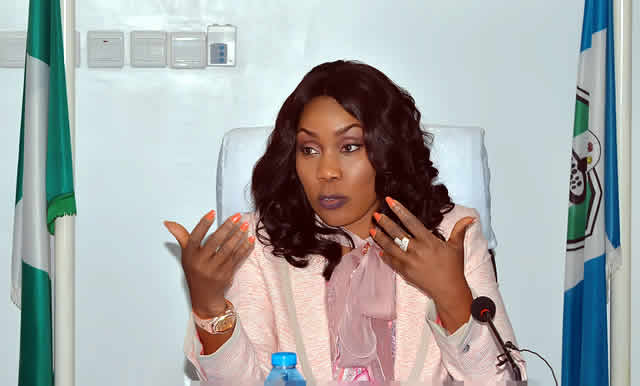What we are doing to end trafficking – DG NAPTIP
The Director General, National Agency for the Protection of Trafficking in Persons (NAPTIP), Julie Okah-Donli spoke on the high rise in the number of cases in the country and what her Agency is doing to rescue victims and other activities. How will the validation for the Policy Document in the fight against human trafficking bring […]

The Director General, National Agency for the Protection of Trafficking in Persons (NAPTIP), Julie Okah-Donli spoke on the high rise in the number of cases in the country and what her Agency is doing to rescue victims and other activities.
How will the validation for the Policy Document in the fight against human trafficking bring succor to victims?
The validation of the policy document on protection for the victims of trafficking is very key because a lot of partners do not realize that the victims of trafficking are different from irregular migrants.
We have had cases where irregular migrant are just put together as one and sent back to Nigeria, they don’t have that special care and protection required, reason being that a lot of victims of trafficking have been violated severely in different forms.
Inside Gombe, Anambra human trafficking syndicate
Kano Emirate Council suspends ward head for child trafficking
The law provides for protection for those victims in terms of ensuring that their human rights have been violated and they get justices of the violation they have gone through.
We want our partners to understand that there is a difference and they must be given the necessary protection in terms of sheltering, giving them psych-social support, medical support, empowering them so that they will not be re-traffic again as against just identifying all of them in one group as irregular migrants.
What measure has your Agency put in place to track Nigerians that are trafficked to the Middle-East?
NAPTIP has been carrying out massive awareness campaigns since its establishment and we will continue till tomorrow.
But I must tell you that it is a work in progress because awareness campaign is not a one off thing and that is why we carry out jingles, we are on the social media and these are part of the awareness.
Awareness is very key and we must not neglect it, part of it is that we also campaign, work with our partners in the law enforcement agencies, the whole of the society and all levels of government and do a lot of training together for people to be able to identify the potential victims of trafficking and traffickers and how we can actually stop this people from following traffickers.
Right now, Nigeria did not have a bilateral labor agreement with any of these countries and so it’s illegal for these agents to take Nigerians outside the country under the guise of any forms of job or for any reason.
The Ministry of Labour in conjunction with other partners are working to make sure that Nigeria signs labour agreement with the relevant countries to ensure that those who want to go out to work do that in a proper and legal manner so that they will not be exploited.
Putting all these measures in place are part of the things we are doing to prevent trafficking of our children to the Middle East and other part of the World.
Has your agency been able to rescue any of these victims from the Middle East and other places?
We have been able to rescue a lot of people from Lebanon, Dubai, Saudi Arabia and across the world.
We rescue victims from the Middle-East almost every week and we will continue to recue as many numbers as we can.
How will you react to the assertion that the punitive measures for traffickers are too mild and reason they continued in this trade?
I am not sure it is about the punitive measures being light or upgrading punitive measures but about implementation.
The laws are there and it is very clear and we don’t have the power to impose sentences on the perpetrators but that power lies with the Judiciary and the Judiciary uses their discretion to impose punishment or sentences on the perpetrators.
NAPTIP implements the Violence Against Persons Prohibition Act (VAPP). We have been implementing this Act since 2015, and we believe the laws are sufficient.
Our worry instead should be on implementation of the law but we have had cases of life imprisonment for perpetrators.
What is your advice for parents as it relate to sending their children abroad for work?
Every parent should apply wisdom when it comes to sending their children overseas.
They should not allow their children to be used as object of sex or as slaves because there is no place like home.
When your children go out of Nigeria in an irregular manner, they are vulnerable to all forms of crimes such as; sex trafficking, organ harvesting and even death.
It is wise to allow your children to only travel out of Nigeria through legal routes and if they have been offered genuine jobs, they will have protection.
